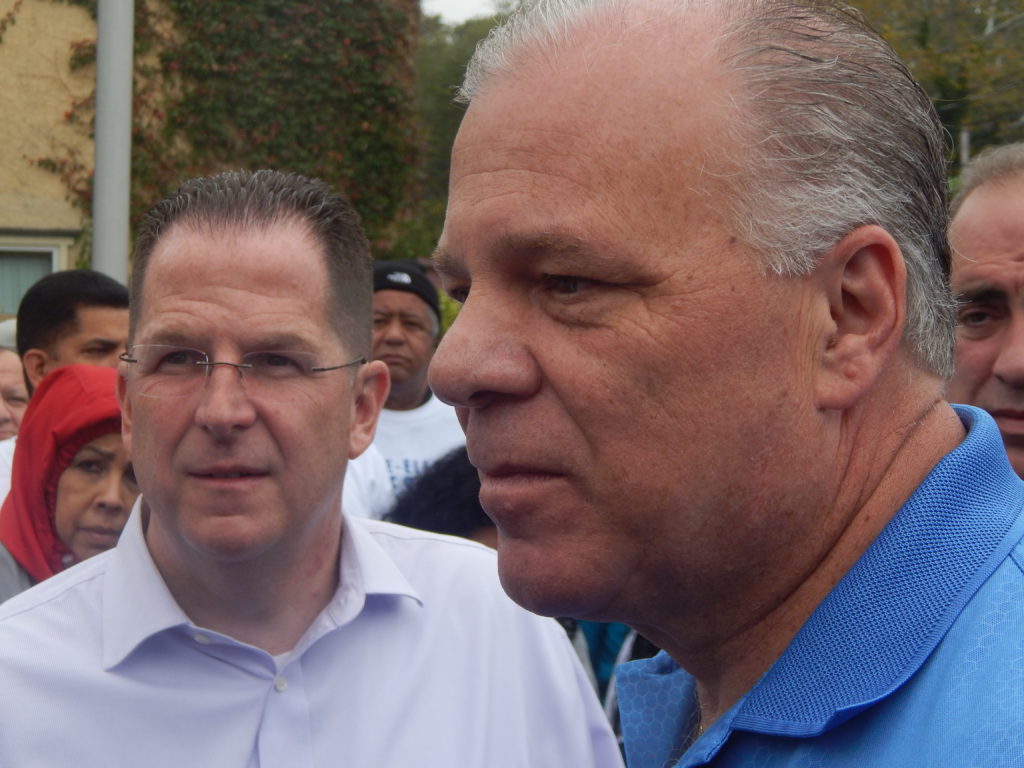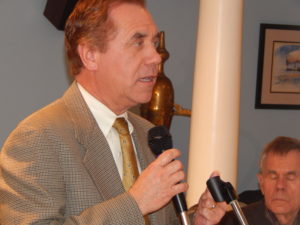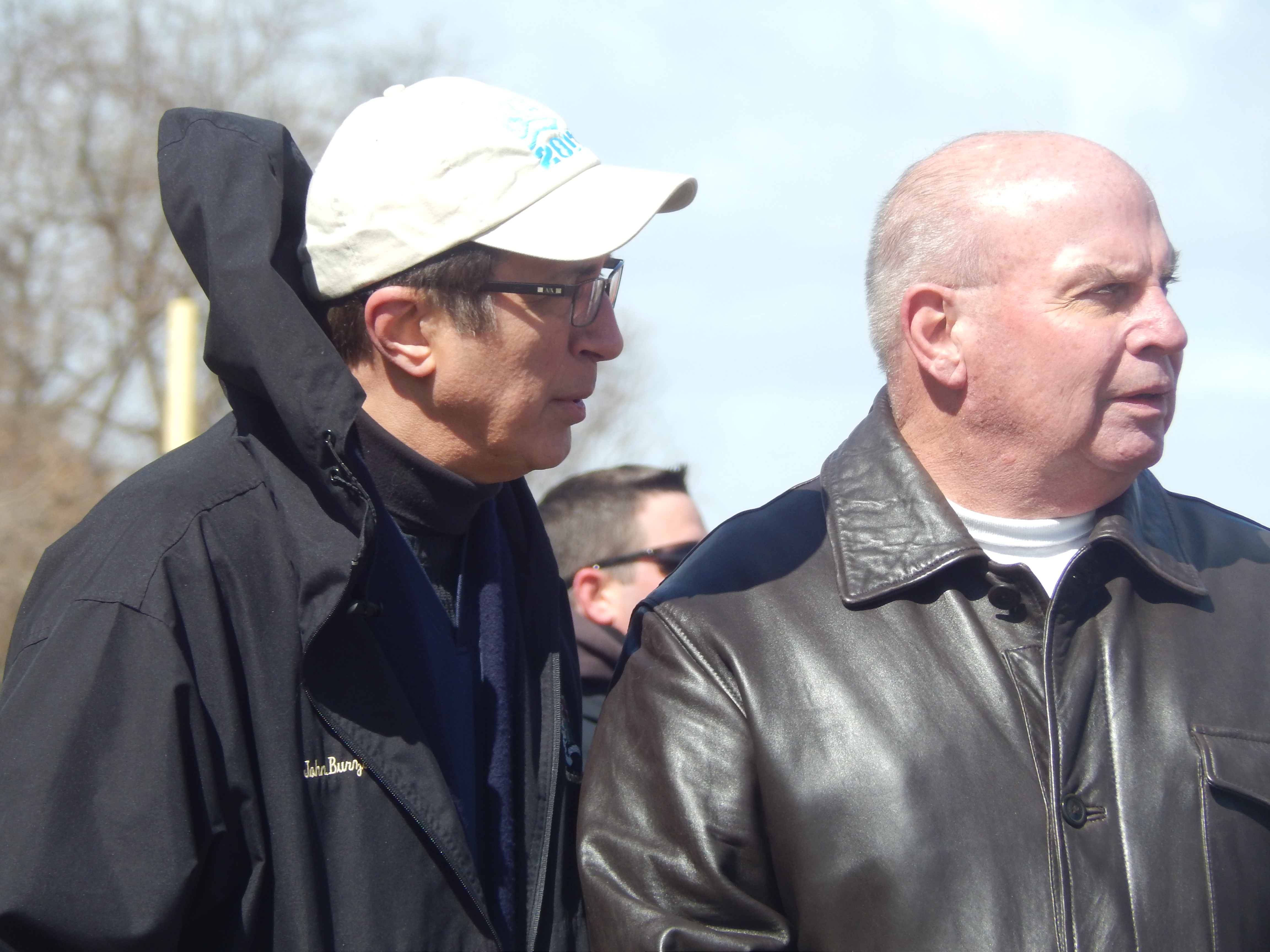Reveille for Sweeney: Three Bills Reveal New Levels of Complexity

Senate President Steve Sweeney's (D-3) unique powers of juggling the often cross purposes of labor, in addition to the state's financial troubles, the politics of a bicameral legislature, a party divide on the heels of a bad year for South Jersey Democrats, and his own lingering (in this case probably inevitable) bitternesses, will be tested in the coming weeks and likely months as he specifically handles three complex and stalled labor bills.
An ironworker by trade, Sweeney has always shouldered the labors of labor with a particular sense of movement relish, even if his brothers and sisters on the public sector side of the equation began calling for his ejection from the ranks as early as the mid 200o's, long before he landed the senate presidency in 2009. But at his ten year mark leading the senate, and arguably himself in a less than commanding position in the aftermath of a party chairmanship fight that occurred without the input of his region, Sweeney faces herculean tasks indicative of fractures in his professional franchise far beyond the usually easy to identify Building Trades versus public sector variety.
To put it gently, he has his hands full, perhaps never the intended object of organized labor as it undertook over two decades to completely control the state legislature under the considerable auspices of a labor-molded senate president.
Senate Bill No. 4219

The bill expands the permissible use of project labor agreements (PLAs) beyond contracts for building-based public works projects, which boiled down to its essential political parts pits Building Trades on trades, specifically the Laborers versus Operating Engineers and, to a somewhat lesser extent, plumbers and carpenters. Greg Lalevee's Operating Engineers supported the bill in Senate Committee when it came up for a vote and are looking forward to the bill being posted in both the Senate and Assembly. Ray Pocino of the Laborers, however, shot off a letter to lawmakers firmly opposing the legislation.
"In the original PLA statute, certain types of work were exempt from the use of PLAs, namely transportation projects, pumping stations and water and sewage treatment plants," wrote Pocino, whom some sources say is the target of the bill. "These categories were exempt from the law, because while the projects can be large in scope, they usually only involve a few of the trades. These particular trades have worked together and for the same contractors for many years, so that the work issues that a PLA resolves are not present in these industries. Additionally, in this case, legislating the use of PLAs won’t even have the added benefit of unionizing the workforce on these projects, as unions already maintain a significant share of the work in this sector in New Jersey.
"Given that this sector is already highly unionized, it is difficult to see how adding the use of PLAs in this area would benefit New Jersey’s workforce, infrastructure, or the taxpayers paying for these projects," the labor leader noted. "What it would certainly accomplish is to diminish the bang taxpayers get for their dollars spent on these projects by creating costly jurisdictional disputes between unions in a sector that is currently stable and efficient. It is unclear what problem, if any, this legislation is aimed at solving, but the disruption it would create in this sector is easy to foresee."
In conclusion, Pocino pointed out to lawmakers how any position on the measure would force them to pick a side in a dispute, conceivably worse than a political pile-up but a trainwreck for Democrats, which Speaker Craig Coughlin (D-19) is certainly aware of as he mulls over options on his side of the legislature.
Sweeney wants it done.
Coughlin, heeding Pocino's point about splitting his entire caucus into hostile Building Trades encampments, wants time and contemplative space.
What good could there be for his caucus fixing bayonets on either side of a Lalevee-Pocino divide?
"Craig doesnt want to get in the middle of that," a source told InsiderNJ. "He wants to put jobs in the pipeline, not fight over a shrinking pie."
It's a problem.
S-4204
The bill fairly staggered out of the senate Labor Committee, with Chairman Fred Madden (D-4) solemnly

bearing multiple panels of critics, Senators Linda Greenstein (D-14) and Joe Lagana (D-38) heavily caveating their "aye" votes, and Senator Tony Bucco (R-25) opposing.
Aimed at management misuse of independent contract labor, the bill is a national AFL-CIO hand-me down, dropped directly into Sweeney's lap by the coast-to-coast-sized allies of President Richard Trumka. Written in the same vein as a recently enacted controversial California law, the bill requires a designation of individuals who perform services for remuneration as employees, not independent contractors, subject to the provisions of employment law, and entitled to all remedies for any violations.
Trumka and company want beachheads in California and on the East Coast.
But on-the-ground critics pushed back strongly in committee.
Sweeney's allies say of the three big labor bills on Sweeney's plate, this one has the best chance of passing sooner rather than later, the consequence of a stepped-up PR campaign aimed at educating opponents about the bill. If Communications Workers of America (CWA) red shirts remain Sweeney's most vociferous critics going back to his partnership with Governor Chris Christie to overhaul public pensions and benefits, a whole new antagonistic flank in the form of indie contractors took shape against this bill, reanimating an old message of Sweeney - the suspenders-wearing ironworker - being "anti-worker."
"He has to go back to the drawing board with the narrative," a source admitted. "This is not an anti-worker bill. It is a worker protections bill."
The source said Greenstein and Lagana are less jittery about the legislation now than they were in committee.
Still, there's some work to do, the source acknowledged, grumbling about the hazards of miniaturizing national labor politics into a state like New Jersey.

S-5815 (The so-called Chapter 78 Relief Bill)
This is the big one, reflective of lonstanding labor bifurcation in NJ.

Tired after eight years of his partnership with Governor Chris Christie, the New Jersey Education Association (NJEA) in 2017 undertook the most expensive legislative fight in the history of of the country to budge Sweeney from power.
They tried to bully, and in the process, got bullied.
Building Trades Boss Bill Mullen grabbed a bullhorn on the morning of Election Day and - like a suspenders-wearing soothsayer, ominously warned of consequences for the teacher's organization.
Sweeney won, and proceeded down a path of political payback, his own quest to place New Jersey on stronger financial footing dovetailing beautifully with his own crystallized Count of Monte Cristo conviction to get revenge on the union that tried to do him in, and their allies, among them Governor Phil Murphy, who incidentally had outdueled Sweeney to become governor.
Mischief runs amok until it fuses together with politics.
The caucus was game, too.
Sweeney for years had given them what they wanted, and possessed a talent for handling competing egos.
A longtime senate ally of the NJEA in the aftermath of the organization's derailed effort to derail Sweneey told InsiderNJ that if he had to pick between the two, he'd pick Sweeney. While Murphy picked the millionaire's tax as his main instrument to tackle a pension payment-saddled state facing the prospect of a $50 billion unfunded liability and reeling amid 11 credit downgrades during the Christie years, Sweeney rolled out what he dubbed his Path to Progress plan.
From Politico last year: "One bill would switch newly-hired public employees or those with just a few years on the job into a pension plan that more closely resembles a 401(k). The other would reduce the state’s share of health care costs. They estimate the proposals could save hundreds of millions of dollars in the short term, and billions over the long haul. Sweeney declined to say how the proposals might impact the budget process. He said he’s waiting to see Murphy’s spending plan, which will be unveiled Tuesday. But the Senate president has drawn a line in the sand, declaring that action needs to be taken to rein in pension and health care costs and that the days of raising taxes to place a Band-Aid on the state’s finances are over."
But Coughlin (and certainly Murphy) appeared less than enthusiastic.
In the words of one statehouse source, "The speaker has not been comfortable with Path to Progress, and the governor is not happy with it beyond some of the low-hanging fruit in the proposal."
Coughlin, in fact, is much more amenable to Chapter 78 reform, that major piece of legislation sought by the NJEA.
On the same week the NJEA issued its 2019 legislative endorsements, the speaker dropped a skeletal bill that met the benchmark of some of the labor organization’s longstanding pen-ben worries.
Significantly it (S-5815) would provide relief from Chapter 78. According to NJTV Correspondent Brenda Flanagan: “Public school teachers claim a 2011 law called Chapter 78 forces them to pay a share of insurance premiums that have increased so quickly that it’s outpacing their annual raises so they’re losing money. To fix it, they’re backing a bill that would link their premium share to a percentage of their salaries, not to health care policies negotiated by school districts. The bill also requires a cap.”
Sweeney wasn’t very happy about Coughlin dropping the bill.
Sweeney and NJEA Prez Marie Blistan had been talking, meeting, trying, in fact, to sing something salvageable out of that 2017 debacle but it was hard.Sweeney knew the organization was ultimately (and even incrementally, let’s face it) be with Governor Phil Murphy. They had made that clear. But what made things harder for Sweeney was the labor organization's late in the year alliance with South Jersey Power Broker George Norcross III ahead of 2020 federal elections and Norcross' brother, U.S. Rep. Donald Norcross (D-1) on the ballot amid threats from the left.
Not only Coughlin, but presumably other Norcross allies, liked the bill. Saves money. $300 million, the speaker said.
Chapter 78 relief.
That made the NJEA happy.
But Sweeney still hates it.
He’s got his Path to Progress plan.
This would step on it.
The bad blood went too deep.
A band aid bill.
He won’t post.
Not the version floating now.
Was there a deal at hand, or to be had?
Would Coughlin absorb some elements of Path to Progress in the Assembly, in exchange for Sweeney moving Chapter 78 relief in the Senate? But what key elements of Path to Progress wouldn't critically alienate Coughlin north of the state's dividing line?
And how could Sweeney, nearly chariot-wheeled by the NJEA in 2017, demonized by public sector workers in every town he set foot in with an argument to reform, turn around and move their homerun legislation without looking defeated, in bad weather already for the South, given Senator Rob Andrzejczak's (D-1) loss last year and U.S. Rep. Jeff Van Drew's (R-2) defection to President Donald J. Trump's GOP?
No one was ready to give Sweeney a ten count. He personally had engendered good will based on performance. The South had access to too much money. They still had five solid senate votes (Sweeney, Cruz-Perez, Madden, Singleton, and Beach; and if they stood to lose a sixth, Addiego, in 2021, they looked to go all out in LD2, a source said). But the resolution of the Democratic chair battle suggested the potential for other developments that did not always include the South and Sweeney inevitably occupying an advantageous position vis-a-vis all other organizations; and the wars with labor were bigger than they were once, demonstrably convergent in the paths of three labor bills, unresolved in the new year, with a state hanging in the balance.





